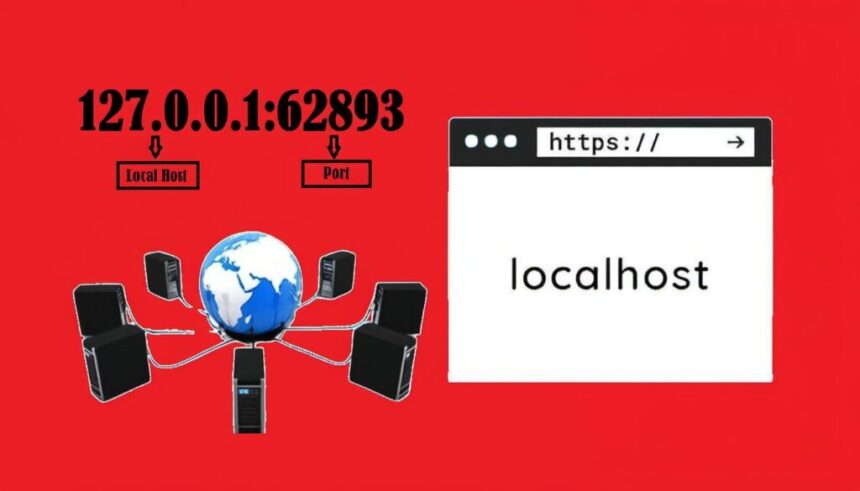Welcome to the fascinating world of localhost, where your computer transforms into a powerful server! Ever heard of 127.0.0.1:62893? This might seem like just another string of numbers and letters, but it holds the key to a realm brimming with potential for developers, tech enthusiasts, and curious minds alike. Whether you’re looking to test applications or explore web development without fear of breaking anything online, understanding this unique IP address is essential. Join us on this journey as we uncover everything you need to know about 127.0.0.1:62893 and how it can elevate your projects!
What is 127.0.0.1:62893?
At its core, 127.0.0.1:62893 is an IP address that points to your own machine—commonly known as localhost. The number 127 signifies the loopback address range, while the “62893” part refers to a specific port on which services can run.
When you use this address in your web browser or software tools, you’re essentially telling your system to connect back to itself. This allows for safe testing and development without any external interference.
The beauty of using localhost lies in its ability to mimic real-world server environments right from your desktop. You can harness it for various applications—from running web servers like Apache or Nginx to developing APIs without exposing them publicly.
In essence, 127.0.0.1:62893 serves as a virtual playground where experimentation thrives and innovation flourishes within the confines of your local environment.
The History of Localhost
The concept of localhost dates back to the early days of networking. In 1980, the Internet Engineering Task Force (IETF) introduced the loopback address with a simple idea: allow devices to communicate with themselves.
Initially defined as 127.0.0.1, this address became synonymous with local connections on devices. Developers quickly adopted it for testing and development purposes, making their work more efficient without needing external servers.
As technology evolved, so did the uses of localhost. It transformed from a mere testing tool into an essential part of web development processes and application deployment strategies.
With advancements in programming languages and frameworks, localhost has become integral to modern software environments. Today, it serves as a playground where developers can experiment freely before launching their projects to the world.
Benefits of Using Localhost
Using localhost offers numerous advantages that cater to developers and tech enthusiasts alike. One significant benefit is the ability to test applications in a safe environment. This ensures that bugs can be identified without affecting live sites.
You also enjoy faster load times since requests don’t have to travel over the internet. Everything runs locally, making it easier to iterate on your projects quickly.
Another perk is enhanced security. By working with localhost, you reduce exposure to potential online threats during development phases.
Moreover, setting up a local server allows for complete control over configurations and environments. You can customize settings precisely as needed without worrying about external factors.
Collaboration becomes seamless too when multiple team members set up their own local instances of an application. Changes remain isolated until you’re ready for deployment, creating a smooth workflow throughout the development process.
Setting Up a Local Server with 127.0.0.1:62893
Setting up a local server using 127.0.0.1:62893 is straightforward and empowering for developers. This IP address refers to your computer’s localhost, allowing you to run applications without needing an external server.
To get started, download a web server software like XAMPP or WAMP. These tools bundle Apache, PHP, and MySQL into one package that’s easy to install.
Once installed, launch the software and start the Apache service. Your local environment will now respond to requests made at 127.0.0.1:62893.
Next, place your project files in the designated folder—often named “htdocs” in XAMPP or “www” in WAMP.
To access your site, open a browser and type http://127.0.0.1:62893/yourprojectname/. Voila! You’re hosting locally with ease while keeping development private and secure.
Common Uses for Localhost
Localhost serves as a playground for developers. They can test and debug applications without any risk of affecting live environments. This makes it an invaluable tool during the development phase.
Websites are often built and tested on localhost before going public. It allows developers to see how their creations perform in real-time, ensuring everything works smoothly.
Another common use is database management. Developers can set up local versions of databases like MySQL or MongoDB, allowing them to manipulate data freely without worrying about security issues.
Additionally, localhost is great for experimenting with different programming languages and frameworks without needing extensive setups or configurations elsewhere. This flexibility fosters innovation and creativity in coding projects.
Educators frequently utilize localhost for teaching purposes. It provides students hands-on experience while minimizing complications associated with remote servers or cloud-based solutions.
Troubleshooting and Tips for Using 127.0.0.1:62893
When working with 127.0.0.1:62893, you might encounter a few hiccups along the way. If your server isn’t responding, first check if it’s running properly. Restarting services can often do wonders.
Another common issue is firewall settings that block incoming connections. Ensure that your local firewall allows traffic on port 62893 to avoid disruptions in access.
Sometimes, browser caching creates confusion when testing changes in real-time. Clear your cache or try accessing it in incognito mode for fresh results.
Don’t forget about checking application logs for error messages; they provide valuable insights into what’s going wrong behind the scenes.
Communities and forums are great resources if you’re stuck—there’s a wealth of knowledge shared by others who have faced similar challenges with localhost setups like yours.
Conclusion
The significance of 127.0.0.1:62893 goes beyond mere numbers on a screen. It is the gateway to understanding localhost—a powerful tool for developers, designers, and tech enthusiasts alike. By exploring its history, benefits, and various applications, you can unlock new possibilities in your workflow.
Setting up a local server using this IP address opens doors to testing environments without the risks associated with live servers. The ease of troubleshooting within localhost makes it an essential practice for anyone working with web development or software engineering.
As you dive deeper into utilizing 127.0.0.1:62893, remember that experimentation is key to mastery. Embrace the learning curve and explore the breadth of opportunities available at your fingertips through this unique digital pathway—who knows what innovations await?








